- Home
- Alex Archer
The Pretender's Gambit Page 17
The Pretender's Gambit Read online
Page 17
“I can’t.”
Quietly, with a small frown, Joana accepted that. She had known when she’d taken up with him that his loyalties were divided. Some days he could be wholly hers, and other days he would be all business, and some of that business dealt with things she would never know about. Sequeira had made certain she understood how things must be when he had taken her into his household.
“What am I to do while you are gone?” she asked.
“Do what you always do. Shop.”
She hugged him. “When do you have to go?”
“Soon.”
“Then enjoy the pool with me for a little while.” She put her arms around his neck and kissed him, pulling him toward the water.
Sequeira destroyed the cell phone and scattered the pieces behind him as he let her guide him into the water. He owned a private jet. He could leave as soon as he wished.
Chapter 21
“Annja?”
“Yes.” Answering the vibrating phone had brought Annja out of a dead sleep. The phone had been lying across her chest, hooked into a charging station in the wall next to her seat. First class was awesome that way. She blinked her eyes and glanced at the compartment around her.
Most of the other passengers were engaged in quiet conversations, read, watched the onboard movie or slept. Beside her, Klykov snored slightly. His fedora rested on his chest and rose and fell with his breaths.
“Where are you?” This time Annja recognized Doug Morrell’s voice.
“I’m on a plane.”
“Going where?”
“To Odessa.”
“Brighton? Why would you go there?”
“Not Brighton. Odessa in Ukraine. On the Black Sea.”
“You know we need to get an idea for the next episode. We’ve only got so much of a window for these things.”
“I’m doing background research for a possible show.”
“In Odessa?”
“Yes.”
“What is it?” Doug sounded suspicious. He knew she stayed torn between doing the television show and following up on whatever artifact had seized her attention.
“Have you heard of a upiors?”
“Not really.”
Annja coughed to clear her throat. “It’s a Slavic vampire. In fact, many etymologists believe that the English word vampire was derived from the original upior legend.”
“You’re going to do a piece on vampires?” Doug’s voice held absolute delight. He loved the whole idea of vampires. Only instead of blood-sucking fiends, he preferred the sexy near-god version of them that was currently popular.
Annja preferred her vampires, if she had to have them. “Polish ones. They have barbed tongues. They’re supposed to bathe in blood.”
“Like Countess Bathory? Amazing!”
“When you stake them, they’re supposed to explode.”
“Even more amazing. Annja, this is a great idea!”
Annja knew that Doug would think so, and she felt bad that she wasn’t going to be able to deliver an actual upior for the show, but she thought she could do some background for a piece on the vampire while she was in Odessa.
“Good. I’m glad you like it.”
“Can you send me anything? Some local stuff? Legends?”
“As soon as I get to Odessa in a few more hours.”
“Amazing. Let me tell the powers-that-be and we’ll get cranking on things at this end.”
“I’ll leave you to that.” Annja ended the call and closed her eyes again.
“A upior?” Klykov asked from beside her.
“I didn’t mean to wake you.”
“Is okay. I can go back to sleep, but maybe I will have nightmares now.”
“Sorry.”
Klykov smiled without opening his eyes. “I have seen many things worse than upiors, Annja. I have never seen a upior.”
“Neither have I, but there should be enough of a history of them in Odessa and nearby environs for me to put a show together.”
“You should use caution when you are in Odessa, though. There are many people who believe upiors exist. I am just not one of them.”
Unable to go back to sleep immediately, Annja reached into her backpack and took out her tablet and her mini–satellite receiver. She hooked the devices together and booted up the tablet. Her first stop was her usual archaeology website.
Rachel, who was [email protected], had written back about the picture of the elephant she had sent.
HEY ANNJA!
SO COOL TO BE PART OF THIS. I GOT HOLD OF TANECHKA AND WE HAD A LONG TALK. I’VE MISSED CHATTING TO HER, SO THIS WAS A GOOD EXCUSE TO RECONNECT. LIFE SOOOO GETS IN THE WAY OF LIVING SOMETIMES!
ANYWAY, TANECHKA TOLD ME HER GRANDFATHER’S NAME WAS ASAF CHISLOVA. HE WAS HER MOTHER’S FATHER, WHICH IS WHY I COULDN’T REMEMBER THE NAME.
TANECHKA SAID THE STORY ABOUT THE ELEPHANT WAS THAT HER GRANDFATHER’S GRANDFATHER, OR SOMEWHERE BACK DOWN THE LINE, GOT THE ELEPHANT BECAUSE HE WAS A COMMANDER IN THE CRIMEAN WAR. I HAD TO LOOK UP CRIMEAN WAR. I DIDN’T KNOW WHAT IT WAS. AND THEN I LEARNED THAT WAS WHERE FLORENCE NIGHTINGALE WAS! I’D ALWAYS THOUGHT SHE WAS A BRIT! AND SHE WAS! BUT SHE GOT FAMOUS WHILE NURSING IN RUSSIA! WHO KNEW?
WELL, YOU PROBABLY DID. :)
HISTORY! YOU GOTTA LOVE IT!
ANYWAY, ABOUT TANECHKA’S GRANDFATHER, THE SAD THING WAS THAT NOBODY KNEW ABOUT HIS STORAGE LOCKER UNTIL IT HAD ALREADY BEEN SOLD OFF AND EMPTIED. HER GRANDFATHER WAS IN A NURSING HOME AFTER A MAJOR STROKE. SHE WENT TO SEE HIM, BUT HE COULDN’T TALK AND NO ONE KNEW WHERE HIS STUFF WAS. I FEEL BAD FOR HER. :(
ANYWAY, I HOPE THIS HELPS.
BYE!
Annja opened an email and sent a response.
RACHEL,
THANKS FOR ALL THE EFFORT. THE INFORMATION DOES HELP. I FEEL BAD FOR YOUR FRIEND, TOO. I’LL SEE IF SOMETHING CAN BE SALVAGED FROM THAT STORAGE UNIT.
Picking up her phone, Annja put a call through to Bart. She knew he would be awake and working by now.
“McGilley.”
“Bart, it’s Annja. I’ve got a favor to ask.”
“Okay, ask in a minute. I got some news I’m not happy about. Since Fernando Sequeira’s name came up in this murder investigation, I’ve had a couple Interpol contacts keep tabs on him. I just got off the phone with them. Sequeira’s private pilot filed flight plans for Odessa, Ukraine. The jet took off only minutes ago. What is going on over there?”
“I don’t know.” Annja considered the situation. “Leonid and I have negotiated with the fence Onoprienko is going to use to sell the elephant. Leonid got the name from a mutual acquaintance. The fence is going to hold Onoprienko up till we get there.”
“You do realize you’re getting deeper and deeper into the criminal element, right?” Bart sounded more worried than angry. Annja counted that as a win.
“When you’re dealing with artifacts and national treasures, you sometimes deal with criminals. Every archaeologist I know has come across tomb raiders and grave robbers. This isn’t the first time I’ve had to work with people like this.”
“You know, I’m beginning to think that the more I know about what you do, the less I like what you do.”
“I love what I do.”
“Look out for Sequeira. He’s bad news. He’s supposed to have someone who’s good at making people disappear. It’s possible that’s the person who whacked Calapez and Pousao in front of the precinct. Until we get the middle guy, it’s going to be hard to connect Sequeira
to those murders. But we think we have a lock on Calapez and Pousao for the murder of the neighbor across the street. Having a homicide on the sheets changes the game and I can now go after Sequeira harder if I’m somehow able to put him with Calapez and Pousao. As you’ll recall, though, they’re not talking.”
Annja heard the annoyance in Bart’s voice and sympathized. “Before I ask for that favor, let me see if I can do one for you. Would your Interpol buddies have a working relationship with the police in Odessa?”
“They might.”
“If I can get hold of Onoprienko, maybe I can hand him off to local authorities who will get him to you.”
“No. Do not do that. Onoprienko is a killer. You’ve seen some of his work firsthand. Forensics confirmed that the blunt object used to kill Maurice Benyovszky was the hammer we found in Onoprienko’s apartment. Do not get around this guy.”
“If he has the elephant, that’s going to happen. If I get the chance to capture him—”
“Do not!”
“—I was thinking it would be good to have someone to hand him off to.” Annja paused. “Unless you’d rather I just let him go.”
Bart sighed. “I’ll see what I can do. You said you needed a favor?”
“Yes. The storage unit the elephant came from belonged to a man named Asaf—”
“Chislova. Yeah, we know, Annja. Sometimes we’re pretty good at doing our jobs, too.”
“I can put you in touch with the granddaughter.”
“We’ve got her name, too.”
“Well, then here’s the favor. The granddaughter didn’t know about the storage unit, or that it was lost. All she knew is that a lot of her grandfather’s things disappeared. She’d like to have a few of them as keepsakes.”
“Sure, I can arrange that. Benyovszky still had some of that stuff in the storage unit he was using as a warehouse for the goods he was selling on the internet.”
“Thanks. And if you can work out something in Odessa, let me know who I should call.”
“What you should do is turn around and come back to New York.”
Annja smiled, enjoying the fact that Bart cared, but she had her own calling to tend to. “That’s not going to happen. I’ll be in touch when I can.”
* * *
RAO WOKE AND had the distinct feeling someone was watching him. Without moving, he scanned the economy-class section of the plane, but there were no faces familiar to him that he could see. He sat up a little straighter and looked in the back section.
Most of the passengers had nodded off, giving in to the long flight. Only a few people remained awake. The adults worked on computers, probably preparing presentations or crunching numbers for a project. The kids played video games with rapt attention.
Unbuckling his seat belt, Rao walked back to the bathroom to get a better look at everyone. No one seemed to have any undue interest in him, but the feeling that he was being watched persisted.
Although he couldn’t pinpoint the watcher, Rao was certain that he and Annja Creed were not alone on the flight.
Chapter 22
As the passenger jet began its approach to Odessa, Annja peered out the window and watched the large city grow closer. Odessa had always been an important port city on the Black Sea and in the surrounding region. It was one of the few warm-water ports in the area, and it had been a point of territorial aggression for hundreds of years.
Residential and business areas occupied neat blocks and geometric shapes marked off by tree-lined streets. The verdant growth was so robust that it looked like the commercial structures had sprouted trees, or that the trees were threatening to climb over the buildings. Nature and industry warred over space, and in that Annja saw a reflection of Odessa’s restless past.
Along the coast, docks thrust out into the harbor. Massive cranes moved like giant robotic arms to clutch cargo containers from the decks of ships and carry them to the docks where stevedores waited to move the goods where they belonged. A few boats sailed the water out beyond the commercial area marked off by buoys.
“Tell me what you see, Annja.”
Annja glanced over her shoulder at Klykov. He’d woken up shortly before the jet had begun its descent. “I thought you’d been to Odessa before.”
Klykov smiled. “I have. Many times. But I’m not talking about what you see below. Everybody sees that. That look I saw in your eyes in the reflection in the glass tells me you are looking at more than what is out there. Tell me what you see.”
“Odessa was settled by the Greeks. Some of the artifacts that have been found in the eastern Mediterranean are from the same time period as those found here. So I can see the Greeks here, flourishing with fields of olives and beautiful buildings.”
“Then where are these buildings?”
“They would have been destroyed by the Pechenegs and Cumans, the ancestors of the Ottoman Empire that fought so hard to reclaim Odessa. They won it back for a time, then lost it again to Catherine the Great. Sometime before Catherine’s armies took this place, the Mongols were led by Batu Khan, who was the grandson of Temujin, who became the greatest threat the civilized world had ever known at that time.”
“I do not know this person.”
“Temujin was known by another name. Genghis Khan.”
Klykov nodded. “That name I do know.”
“Batu Khan formed the Ulus of Jochi, and they were also known as the Golden Horde.”
“Because they came to rob the gold?”
“No. Because of the color of their tents.” Annja could almost see the Mongol campsites that had littered the hills. She could imagine the burning villages along the coast, the survivors huddling in fear at the savagery the invaders had displayed. “The Mongol language translates their name literally into Golden Horde, which some people think was due to the color of their tents, but for Mongols it probably simply meant ‘central camp.’ But legends grow up around such things. After the Mongols, the Ottoman Empire claimed the area.”
“Why?”
“For the same reason Odessa is so important today. It’s a warm-water port this far north. Trade can get through. The military can get in. Back before planes changed the geography of war, the lines were drawn by accessibility. You can’t march an army into enemy territory without a supply line. Once you get into Ukraine, you can go east into Russia, or west into Europe. The country has been in the center of some particularly nasty military operations, and many of them were staged here.”
The seat-belt sign flashed on, followed by the captain’s orders to buckle them.
Annja secured her seat belt, still lost in the history of the place, aware that Klykov was listening intently. “For a while, the Ottoman Empire took control of the city, but they couldn’t hold it against the Russians. Catherine the Great named the city Odessa because they believed it was the site of the Greek city Odessos. Later, historians found out that probably wasn’t accurate. Odessos was more likely over in Bulgaria, near Varna. Catherine built the city on the bones of Khadzhibey, the prior Turkish town. The Ottoman Empire and Catherine the Great fought over Odessa for a while, but Catherine’s forces held the city.”
The plane banked and began a sharper descent. Below, the surface of the Black Sea grew close enough to see the chop of the waves.
“You know many things, and it is interesting to hear them.” Klykov’s eyes twinkled and his smile was broad. “You have a remarkable mind, young lady.”
Annja shook her head. “What’s remarkable is history. Anyone who studies it can open up whole worlds, each different and exciting. They can be as small as an Englishwoman trying to make a living after the Napoleonic War when the men returned from the army, or as large as the Wo
rld War II campaigns. I can take someone from now and put them in the shoes of someone who lived thousands of years ago, show them that the daily concerns and needs and fears are pretty much the same. Despite the fact that hundreds or thousands of years separate a person of today from someone in the past, if I do it right, they can feel what it’s like to live that person’s life. That’s why I love what I do.”
“It is always good to have passion. I have always said this. Life without passion is nothing.” Klykov looked through the window once again. The jet sailed on toward the airport, and the runway was only a few feet below them. “Soon we will have that elephant you are searching for, and then you will find more stories to tell, da?”
“I hope so.” The jet’s tires hit the runway and Annja resisted the forward momentum the reduced airspeed caused.
* * *
WHILE WAITING AT the car rental agency, Klykov called his contact, Fedotov the fence, and talked quickly in Russian. Annja couldn’t pick up enough of what was said to know for certain what was going on. She tried not to let herself become anxious, but that was difficult. There was no way to know if Onoprienko was going to actually show up at the place, or if Fedotov could keep Onoprienko there.
There was also the possibility that Fedotov would tell Onoprienko that people were there looking for him so that he could renegotiate the amount he’d agreed to pay for the elephant. The fence was a thief, after all.
While she stood a short distance away, a Hispanic woman approached her with a travel book in one hand and a hopeful expression on her face. She was in her midthirties, dressed conservatively and wore little makeup. She didn’t need it. She was a pretty woman without it. She wore her hair cropped short and stood almost as tall as Annja.
“Pardon me,” she said in English with a definite Western accent. “Have you been to Odessa before?”
“I have.”
“It’s my first time and I feel pretty lost.”
“Where are you trying to go?”
“I’m supposed to meet some friends at a restaurant called Ode to Odessa?”

 Rogue Angel: Forbidden City
Rogue Angel: Forbidden City The Spider Stone
The Spider Stone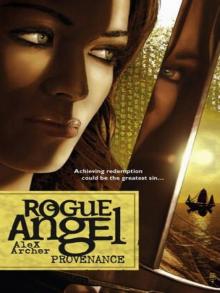 Provenance
Provenance Blood Cursed
Blood Cursed Fury's Goddess
Fury's Goddess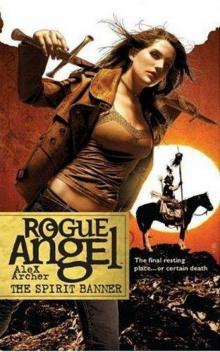 The Spirit Banner
The Spirit Banner Footprints
Footprints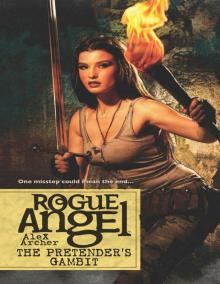 The Pretender's Gambit
The Pretender's Gambit Rogue Angel: The Lost Scrolls
Rogue Angel: The Lost Scrolls Staff of Judea
Staff of Judea Rogue Angel 55: Beneath Still Waters
Rogue Angel 55: Beneath Still Waters The Mortality Principle
The Mortality Principle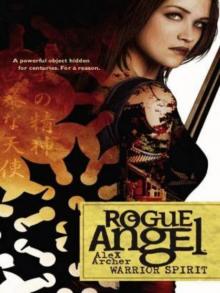 Warrior Spirit
Warrior Spirit Paradox
Paradox Tear of the Gods
Tear of the Gods Forbidden City
Forbidden City River of Nightmares (Rogue Angel)
River of Nightmares (Rogue Angel) Rogue Angel: The Secret of the Slaves
Rogue Angel: The Secret of the Slaves Destiny
Destiny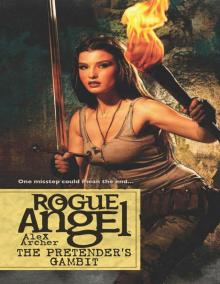 Rogue Angel 51: The Pretender's Gambit
Rogue Angel 51: The Pretender's Gambit Celtic Fire
Celtic Fire Rogue Angel 54: Day of Atonement
Rogue Angel 54: Day of Atonement Day of Atonement
Day of Atonement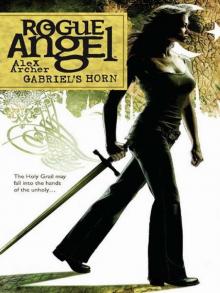 Rogue Angel: Gabriel's Horn
Rogue Angel: Gabriel's Horn Grendel's Curse
Grendel's Curse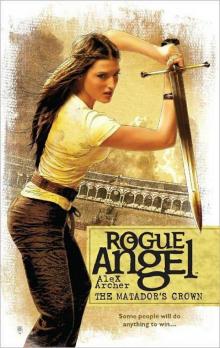 The Matador's Crown
The Matador's Crown Rogue Angel: The Chosen
Rogue Angel: The Chosen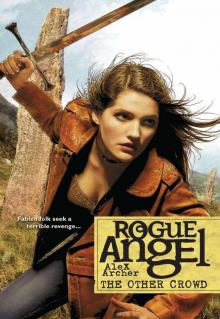 The Other Crowd
The Other Crowd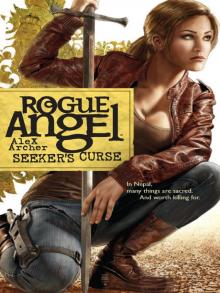 Seeker’s Curse
Seeker’s Curse Rogue Angel 52: Death Mask
Rogue Angel 52: Death Mask The Golden Elephant
The Golden Elephant Blood Cursed (Rogue Angel)
Blood Cursed (Rogue Angel) Celtic Fire (Rogue Angel)
Celtic Fire (Rogue Angel)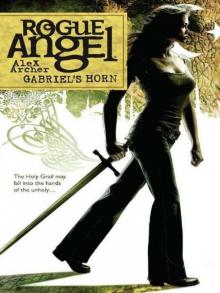 Gabriel's Horn
Gabriel's Horn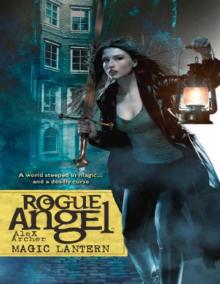 Magic Lantern (Rogue Angel)
Magic Lantern (Rogue Angel) God of Thunder
God of Thunder Clockwork Doomsday
Clockwork Doomsday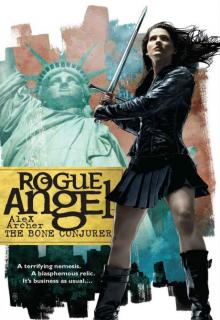 The Bone Conjurer
The Bone Conjurer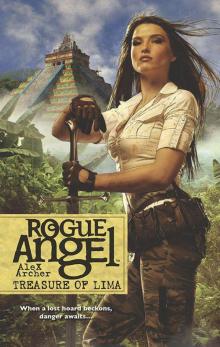 Treasure of Lima
Treasure of Lima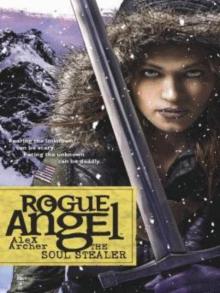 The Soul Stealer
The Soul Stealer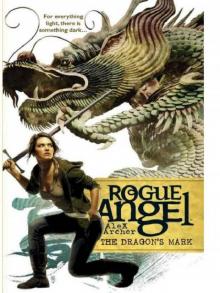 The Dragon’s Mark
The Dragon’s Mark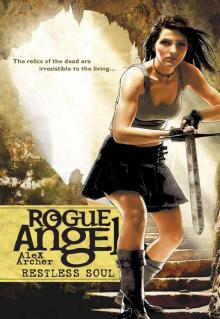 Restless Soul
Restless Soul Rogue Angel: God Of Thunder
Rogue Angel: God Of Thunder Rogue Angel 49: The Devil's Chord
Rogue Angel 49: The Devil's Chord Death Mask
Death Mask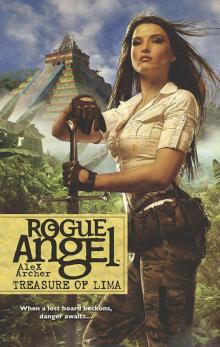 Rogue Angel 46: Treasure of Lima
Rogue Angel 46: Treasure of Lima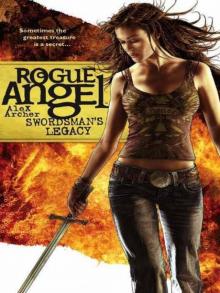 Swordsman's Legacy
Swordsman's Legacy The Oracle's Message
The Oracle's Message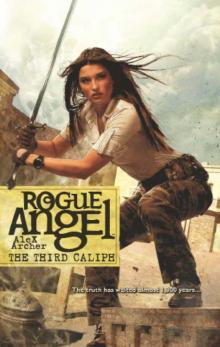 The Third Caliph
The Third Caliph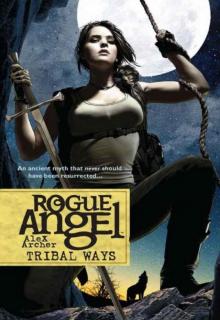 Tribal Ways
Tribal Ways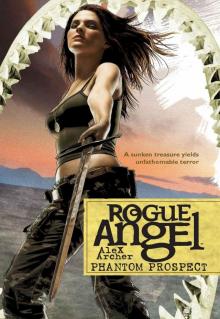 Phantom Prospect
Phantom Prospect Rogue Angel 50: Celtic Fire
Rogue Angel 50: Celtic Fire Library of Gold
Library of Gold Rogue Angel 53: Bathed in Blood
Rogue Angel 53: Bathed in Blood Sacred Ground
Sacred Ground The Devil's Chord
The Devil's Chord Serpent's Kiss
Serpent's Kiss The Vanishing Tribe
The Vanishing Tribe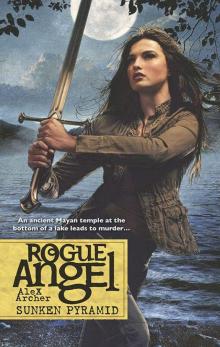 Sunken Pyramid
Sunken Pyramid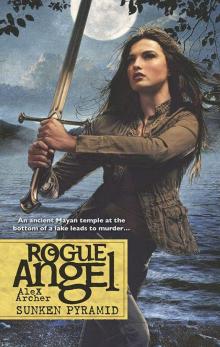 Sunken Pyramid (Rogue Angel)
Sunken Pyramid (Rogue Angel)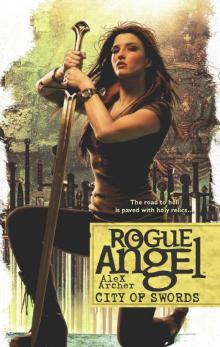 City of Swords
City of Swords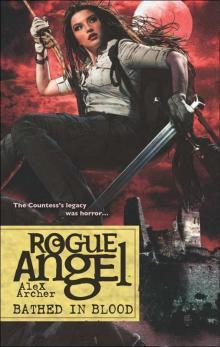 Bathed in Blood
Bathed in Blood The Lost Scrolls
The Lost Scrolls The Babel Codex
The Babel Codex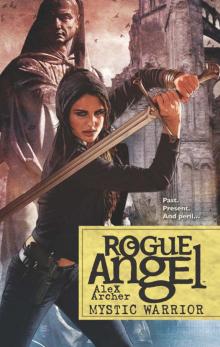 Mystic Warrior
Mystic Warrior Eternal Journey
Eternal Journey Beneath Still Waters
Beneath Still Waters Solomon's Jar
Solomon's Jar Beneath Still Waters (Rogue Angel Book 55)
Beneath Still Waters (Rogue Angel Book 55) Cradle of Solitude
Cradle of Solitude Secret of the Slaves
Secret of the Slaves River of Nightmares
River of Nightmares Polar Quest
Polar Quest False Horizon
False Horizon